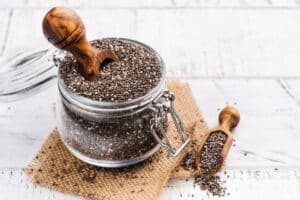 According to the National Osteoporosis Foundation, a woman’s risk of breaking a hip due to osteoporosis is equal to her risk of breast, ovarian and uterine cancer combined. Studies suggest that 1 of every 2 females will break a bone in their lifetime due to this debilitating disease. Women over 50 who have gone through menopause are at an increased risk for brittle bones and fractures. Thankfully, however, there are many diet and lifestyle adjustments we can make to help maintain proper bone density. And while maintaining a healthy weight, participating in weight bearing and muscle strengthening exercises, and not smoking are all important, consuming adequate calcium and maintaining appropriate vitamin D levels are absolutely essential for skeletal health.
According to the National Osteoporosis Foundation, a woman’s risk of breaking a hip due to osteoporosis is equal to her risk of breast, ovarian and uterine cancer combined. Studies suggest that 1 of every 2 females will break a bone in their lifetime due to this debilitating disease. Women over 50 who have gone through menopause are at an increased risk for brittle bones and fractures. Thankfully, however, there are many diet and lifestyle adjustments we can make to help maintain proper bone density. And while maintaining a healthy weight, participating in weight bearing and muscle strengthening exercises, and not smoking are all important, consuming adequate calcium and maintaining appropriate vitamin D levels are absolutely essential for skeletal health.
Recent studies suggest supplementation may increase the risk of heart attack, vascular calcification and kidney stones.
Most of us have been advised to take calcium supplements to ensure the recommended daily allowance of 1200mg for women in their prime without consideration of dietary intake. However, several recent studies suggest that supplementation beyond the recommended amounts may increase the risk of heart attack, vascular calcification and kidney stones. And while some experts remain cautious about this link, most agree that the evidence is strong enough to play it safe.
Consequently, many doctors are taking a second look at their previous recommendations and now suggesting that we assess our daily calcium intake which is not linked to health risks, modify our diets to include more calcium-rich foods, and only take supplements when daily consumption falls short. I couldn’t agree more. Getting our body’s nutritional needs from whole, real food is the best approach.
Here’s what I recommend:
1. Assess your calcium intake: Look at the nutritional panel of the foods you’re eating to determine how much calcium you’re getting each day. Nutritional facts labels list calcium content in a serving of food as a percentage of the Daily Value (DV). The DV of calcium is 1000mg so if a serving of food provides 20% DV you know a serving contains 200mg. 15% would contain 150mg per serving and so forth.
2. Use the National Osteoporosis Foundation’s a guide to calcium-rich foods to help determine your daily intake.
3. Incorporate the following calcium-rich powerhouses into your diet.
Dairy Products: Low and no-fat milk, yogurt, kefir and cheese are wonderful natural sources of calcium. A serving of dairy ranges from 200mg-300mg, nearly a quarter of the daily recommended amount for women over 50. Given the high saturated fat and sodium content of cheese, I recommend choosing ricotta, or a low-fat, low sodium variety, if at all.
Plant-based “milks”: If you don’t consume dairy, no worries. Most milk alternatives like almond, soy, coconut, hemp, rice and flax are fortified with as much calcium as a glass of regular milk.
Canned sardines: Just 3oz of this heart healthy protein, contains over 300mg. Throw them on your salad or enjoy them straight from the can.
All dark leafy greens but especially collards: While kale, arugula, Chinese cabbage, broccoli rabe, mustard, dandelion and turnip greens are wonderful sources of calcium, cooked collards really shine, delivering 360mg per cup.
Edamame: High in protein, low in carbs and filled with 100mg of calcium per ½ cup, these beans make the perfect snack or addition to your salad. Try Seapoint Farms roasted treats or Woodstock Farms fresh-shelled variety.
4. If you’re not getting 1200mg of calcium a day from food, supplement as needed. To order a high quality calcium supplement, click here.
5. Space it out: Our bodies absorb calcium best in doses of less than 500mg, so spread your intake out over the day. If you’re on thyroid medication, you may be advised to avoid eating foods high in calcium within 4 hours of taking your meds. Consult your physician.
6. Check your Vitamin D levels. Our body requires adequate vitamin D to absorb calcium. Unfortunately, there are few natural sources of this nutrient, so it’s very difficult to get enough from our diet. Unprotected sun exposure remains the best source but concerns over skin cancer obviously prohibit such action. Consequently, most women need to take a supplement. Have your levels tested and talk to your doctor about your results. I recommend maintaining a level near 50 ng/ml. If low, consider supplementing with this high quality D3 vitamin.
7. Avoid excessive amounts of alcohol, caffeine and salt. All can decrease the body’s absorption of calcium. 100% wheat bran can too so forgo the cereal in the morning and replace it with plain yogurt and fresh fruit.
In summary:
Understand that calcium is essential for our overall health but taking large doses of a supplement may not be effective and may even be harmful. To help prevent osteoporosis, attempt to consume 1200mg from food each day but no more than 500mg at any given time. If you can’t reach the recommended daily allowance, then take a supplement, but don’t overdo it.







